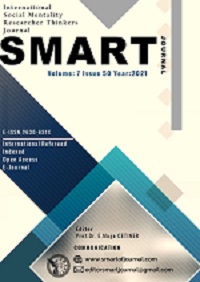HALK EĞİTİM MERKEZLERİNDE GÖREV YAPAN ÖĞRETMENLERİN VE USTA ÖĞRETİCİLERIN HAYAT BOYU ÖĞRENME EĞİLİMİ İLE MESLEKİ DOYUMLARI ARASINDAKİ İLİŞKİNİN İNCELENMESİ
Author :
Abstract
Bu araştırmanın temel amacı; halk eğitim merkezlerinde görev yapan öğretmenlerin ve usta öğreticilerin hayat boyu öğrenmeye ilişkin algıları ile mesleki doyum düzeyleri arasındaki ilişkiyi incelemektir. Araştırmada nicel yöntem kullanılmıştır. Araştırmanın nicel kısmı ilişkisel tarama modelinde desenlenmiş olup hayat boyu öğrenme eğilimleri ve mesleki doyum ölçekleri kullanılmıştır. Araştırmanın çalışma grubu, 2020-2021 eğitim - öğretim yılında Diyarbakır ilindeki halk eğitim merkezinde görev yapan usta öğreticiler ve öğretmenler oluşturmaktadır. Bu evrende kolay örnekleme yoluyla 233 katılımcıya ulaşılmıştır. Nicel veriler pearson korelasyon ve regresyon analizi ile analiz edilmiştir. halk eğitimi merkezi görev yapan öğretmenlerin ve usta öğreticilerin hayat boyu öğrenme eğilimleri ile mesleki doyum arasındaki ilişki anlamlı bulunmuştur. Buna göre hayat boyu öğrenme eğilimleri mesleki doyum değişkenini %76 oranında açıklamaktadır. Dolayısıyla yönetici ve öğretmenlerin hayat boyu öğrenme eğilimleri arttıkça mesleki doyumları da artmaktadır. Alanyazında yaşam boyu öğrenme ve iş doyumu alanında çeşitli çalışmalar mevcut olmasına rağmen bu iki değişkeni birlikte inceleyen çalışma sayısı sınırlı düzeydedir. Yaşam boyu öğrenme ve iş doyumu ile ilgili karma veya nitel yöntemler kullanılarak çalışmalar yapılabilir ve böylece iki değişken daha derinlemesine incelenmesi gerçekleşebilir.
Keywords
Abstract
The main purpose of this research is; The aim of this study is to examine the relationship between the perceptions of teachers and master trainers working in public education centers about lifelong learning and their professional satisfaction levels. Quantitative method was used in the research. The quantitative part of the study was designed in the relational survey model, and lifelong learning tendencies and occupational satisfaction scales were used. The study group of the research consists of master trainers and teachers working in the public education center in Diyarbakır in the 2020-2021 academic year. In this universe, 233 participants were reached through easy sampling. Quantitative data were analyzed by pearson correlation and regression analysis. The relationship between lifelong learning tendencies of teachers and master trainers working at public education centers and professional satisfaction was found to be significant. Accordingly, lifelong learning tendencies explain the variable of professional satisfaction by 76%. Therefore, as lifelong learning tendencies of administrators and teachers increase, their professional satisfaction also increases. Although there are various studies in the field of lifelong learning and job satisfaction in the literature, the number of studies examining these two variables together is limited. Studies on lifelong learning and job satisfaction can be carried out using mixed or qualitative methods, so that a more in-depth examination of the two variables can be realized
Keywords
- Aspin D.N. ve Chapman J.D. (2000). Lifelong learning: concepts and conceptions. International Journal of
- Aspin D.N. ve Chapman J.D. (2000). Lifelong learning: concepts and conceptions. International Journal of Lifelong Education, 19 (1), 2-19.
- Aşık, N. A. (2010). ''Çalışanların İş Doyumunu Etkileyen Bireysel ve Örgütsel Faktörler ile Sonuçlarına İlişkin Kavramsal Bir Değerlendirme'', Türk İdare Dergisi, S. 467, ss. 31- 51.
- Candy, P. C. (1994). Lifelong learning and information literacy. Report for U.S. National Commision on Libraries and Information Science and National Forum on Infırmation Literacy.
- Ehtiyar, V. R. (1996).'' Otel İşletmelerinde Çalışan Personelin Tatmini ve Antalya Yöresinde Yapılan Bir Araştırma. Verimlilik Dergisi'', C. 17, S. 3, ss. 109-121.
- Gözübüyük-Tamer, M. (2013). Yaşam boyu öğrenme için ulusal yeterlilikler çerçevesi: Avrupa ve Türkiye örneği. Uluslararası Eğitim Programları ve Öğretim Çalışmaları Dergisi, 3(5), 43-54.
- Güleç, İ., Çelik, S. ve Demirhan, B. (2012) “Yaşam Boyu Öğrenme Nedir? Kavram ve Kapsamı Üzerine Bir Değerlendirme”. Sakarya University Journal of Education, 2(3), s.34-48.
- Güler, B. (2004) “Avrupa Birliği’nin Yetişkin Eğitim Programı Grundtvig Çerçevesinde Halk Kütüphanelerinin Yeri Ve Önemi” (Yüksek Lisans Tezi). Ankara Üniversitesi, SBE, Ankara.
- Gündoğan, N. (2003). Avrupa Birliği'ne üye ülkelerde bir istihdam politikası aracı olarak yaşam boyuöğrenme ve bazı örnek program ve uygulamalar. Kamu-İş İş Hukuku ve İktisat Dergisi, 7(2), 2-15. http://www.kamu-is.org.tr/pdf/7223.pdf
- Knowles, M. (1996). Yetişkin öğrenenler, göz ardı edilen bir kesim. Ankara: Ankara Üniversitesi Basımevi.
- Kumar, P. (2004) Lifelong learning in Singapore: Where are we now? International Journal of Lifelong Education 23(6), 559-568.
- MEGEP. (2006). Türkiye'nin başarısı için itici güç: Hayat boyu öğrenme politika belgesi. Ankara OECD. (1996). Lifelong learning for all. Paris: OECD.
- Rausch, A.S. (2003). A case study of lifelong learning in Japan: objectives, curriculum, accountability, and visibility. International Journal of Lifelong Education. 22 (5), 518-532.
- Silah, M. (2001). Çalışma Psikolojisi. Ankara: Seçkin Yayıncılık. Sinclair, R. R., Martin, J. ve Michel, R. P.(1999). ''Full-Time andPart-Time SubgroupDifferencesin JobAttitudesandDemographicCharacteristics'',Journal Of VocationalBehavior, C. 55, S. 3, ss. 337-355. Sosyal Güvenlik Kurumu. (2016). ''SGK İstatistikYılları 2016'', http://www.sgk.gov.tr/wps/portal/sgk/tr/kurumsal/istatistik/sgk_istati stik_yilliklari (Erişim: 17.02.2018).
- Torun, B. (2020), Öğretmenlerin Yaşam Boyu Öğrenme Yeterlikleri Ve İş Doyum Düzeylerinin İncelenmesi” (Yüksek Lisans Tezi). Maltepe Üniversitesi, İstanbul.
- Torun, B., Güvercin, Seçkin G. (2021), Öğretmenlerin Yaşam Boyu Öğrenme Yeterlikleri Ve İş DoyumDüzeylerinin İncelenmesi. Yeditepe Üniversitesi Eğitim Fakültesi Dergisi, 10(12), s. 1-22. World Bank.(2003). Lifelong learning in the global knowledge economy challenges for developing countries. The World Bank: Washington, D.C.
- Karakuş, M. (2008). İlköğretim okul yöneticilerinin ve öğretmenlerin duygusal zekâ yeterliklerinin,öğretmenlerin duygusal adanmışlık, örgütsel vatandaşlık ve iş doyumu düzeylerine etkisi. Yayımlanmamış Doktora Tezi, Fırat Üniversitesi, Elazığ.
- Gür-Erdoğan, D., Arsal, Z. (2016). The development of lifelong learning trends scale. Sakarya University Journal of Education, 6(1), 114-122.





